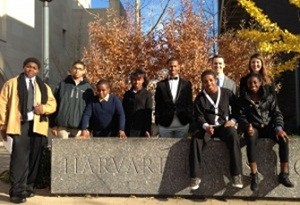By: Amanda Kool, Clinical Fellow,Transactional Law Clinic
Wednesday, December 4th was a day for the record books of the revamped Community Enterprise Project of the Transactional Law Clinics (CEP). After months comprised of countless meetings with clients and community partners, treks from campus to Jamaica Plain, toolkit revisions, and lunch jaunts to City Feed (restaurant Jamaica Plain), the three CEP students capped the semester with a whirlwind, 12-hour day in which their efforts culminated with an ease which belied the amount of effort it took to get there.
After an end-of-year breakfast in Jamaica Plain and a few finishing touches on individual cases at the Legal Services Center, the team picked up 100 copies of the freshly printed Boston Food Truck Legal Toolkit before heading to Boston’s City Hall. There, CEP was joined by members of the Harvard Law School Food Law and Policy Clinic (FLPC), who represent the other half of the cross-clinical team working on the food truck project, and together the clinics presented the materials contained in the toolkit to a lively audience of inspiring food truck owners on behalf of the Mayor’s Office of Food Initiatives (OFI). FLPC student Jason Qu ‘14 expertly clarified Boston’s food truck permitting and licensing regimes, while CEP students Veronica Sauer ’14 and Josh Wackerly ‘14 guided the attendees through the finer points of business formation, employment law, and other legal implications of starting a business. “Our challenge [with the toolkit and presentation] was to make a complex body of laws and regulations accessible for the community,” stated Qu. “We ended up creating a valuable resource for potential vendors and for the City itself.” As team members leafed through the 77 page document, which had been carefully organized to guide a potential food truck vendor through the myriad of legal processes of starting a food truck from business plan to sample contracts, Wackerly added, “when you see [the Toolkit] in print, you can definitely appreciate the amount of work the whole team put into it. It was very rewarding to be able to finish such a major project and then have the opportunity to turn around and present that product to the public and immediately witness the positive impact we’ve had on the community.”
At the end of the presentation, each attendee walked away with not only a deeper understanding of the process and a copy of the toolkit, but also an invitation to contact the FLPC/CEP team for individual legal representation, whether for assistance navigating one piece of the process or for help with all of it. Officials from the City of Boston were similarly pleased with the toolkit and presentation. Peter Murphy, Program Coordinator of OFI, commented afterward, “The presentation was thoughtful, incredibly clear, and provided a real benefit to the potential [food truck] vendors. The resources [the clinics] have created for us are really vital to the help that we are able to provide vendors – I cannot thank [CEP and FLPC] enough.” For the FLPC and CEP students involved, the end of Wednesday’s presentation meant a challenging and fulfilling semester of clinical work was now officially behind them. Sauer remarked, “I’m incredibly proud of the toolkit we compiled, as well as the way we all worked together as a team to produce a document that we are all proud of and all feel ownership for. I think creating a lasting resource for the community was a tremendous thing to accomplish.”
For FLPC Director Emily Broad Leib and Transactional Law Clinics attorney and Clinical Fellow Amanda Kool, Wednesday also marked the culmination of over a year’s worth of preparation, but only the beginning of ongoing cross-practice collaboration. Under Broad Leib’s supervision, former students of the FLPC, including Duncan Farthing-Nichol ’14, had begun work with OFI over a year prior to conduct an in-depth review of the city’s current rules for food trucks and recommend changes to streamline the process, improve efficiency, and facilitate expansion of the program. After FLPC delivered policy recommendations on those rules to OFI, FLPC engaged CEP to tackle the general legal challenges faced by aspiring food truck vendors. CEP students, including former student Ryan Hatten ’14, supplemented the permitting and licensing information with the types of general transactional law information for which clients contact the Harvard Transactional Law Clinics each day, but tailored to the specific needs of food truck vendors. Connections were made with existing food trucks, commissary kitchens, payroll service companies, and business assistance providers over the span of a year to fill knowledge gaps in the toolkit. A full description of the project can be found in an article co-authored by Broad Leib and Kool, “Using Cross-practice Collaboration to Meet the Evolving Legal Needs of Local Food Entrepreneurs,” which was published in the Fall 2013 issue of the quarterly American Bar Association magazine Natural Resources and Environment. Kool explains, “When Emily and I co-wrote the ABA article in the spring, we utilized the publication to outline the steps our respective clinics would each take to get to the project where we wanted it to go. By the time the publication hit mailboxes across the country this week, we had achieved each of those steps, precisely as we had envisioned.”
Yet the production of the Food Truck Toolkit marks only a milestone (if a major one) in the clinics’ efforts to support Boston’s food truck community. Broad Leib, looking forward to next semester, continues, “The next phase of the plan is for CEP to begin representing individual food trucks and transfer the wisdom gained back to FLPC, effectively closing the feedback loop to guide FLPC’s next round of policy recommendations to the City. Though the hardest part is now behind us, this cross-practice collaborative model allows us to continue to work together in a synergistic way, utilizing the particular strengths of each clinic to generate a return on the collaboration that is greater than the sum of its individual successes.”
While the FLPC/CEP food truck project will conduct additional trainings and begin to represent individual food truck vendors moving forward, new client casework and a number of new community projects will be brought into CEP’s mix, as well. Next semester, CEP will double in size, with six students working out of the Legal Services Center. Like this semester, CEP students will split their time between individual, direct client representation and large, collaborative projects. CEP students Wackerly and Brett Heeger ‘14 have decided to continue with CEP into the spring semester. “For me,” states Heeger, “what makes CEP so exciting is the chance we have to think about community needs from multiple angles.” He adds, “Many HLS students are interested in doing pro bono work after graduation, including fellowships like Equal Justice Works and Skadden or pro bono practices within law firms. Project development skills learned through CEP offer direct experience that can be applied to designing or helping to expand pro bono practices – experience that is rarely available, especially in the transactional law realm.”
Despite its rapid growth, CEP will continue to focus its work in the community of Jamaica Plain and surrounding neighborhoods. “It’s been immensely rewarding to immerse myself in the communities in which I’m working,” Heeger continues. “I’ve been invited to concerts where my clients are performing, eaten food that my clients have produced, and bumped into community leaders on the street outside the Legal Services Center. People have been incredibly welcoming and enormously grateful as CEP has attempted to find opportunities to expand and support otherwise underserved needs.”


